Effects of COVID-19 Pandemic on Mental Health
The Coronavirus pandemic not only threatens physical health, but also the mental health of every individual. Not only fear, but psychological effects can also have a serious impact. What mental health disorders can arise and how to overcome them?
Effects of COVID-19 Pandemic on Mental Health
The outbreaks of coronavirus infection or COVID-19 are widespread and have infected people in more than 190 countries.
This certainly can cause fear and panic. What’s more, the government’s order to stay at home and the social distancing policy, more or less creates emotional distance between family, friends, coworkers, friends, or fellowship in places of worship that can provide mutual support.
For some people, this can be felt like an enormous pressure or burden. If not controlled, the pressure will harm mental health.
Mental Health Disorders During Coronavirus Pandemic
Mental health disorders that occur during a pandemic can be caused by various things, such as fear of epidemics, feelings of isolation during quarantine, sadness, and loneliness due to being away from family or loved ones, anxiety about the necessities of daily life, plus confusion due to information mazy.
These things affect not only people who suffer from mental disorders, such as depression or generalized anxiety disorder, PTSD, stress, but they also can also affect people who are physically and mentally healthy.
Some groups that are vulnerable to psychological stress during the Coronavirus pandemic are children, the elderly, and medical staff. The pressure that occurs during this pandemic can disrupt the form of:
- Excessive fear and anxiety for the safety of yourself and those closest to you
- Changes in sleep and eating patterns
- Bored and stressed because of constantly being at home, especially in children
- Difficult to concentrate
- Alcohol and drug abuse
- Deteriorating physical health, especially in sufferers of chronic diseases, such as diabetes and hypertension
- Psychosomatic disorders
Also read: CONTROLLING ANXIETY ATTACK
The uncertainty about pandemics can trigger stress
The never-ending COVID-19 pandemic began to make many people feel emotionally drained. After being haunted by fear and misgivings, cabin fever began to strike as a result of staying too long at home.
Unfortunately, no one knows for sure when the pandemic will end. It is this uncertainty that often causes stress and if uncontrolled at any time can affect a person’s psychological state.
==> KN90 Face Mask is Reusable Safety Protection with Ear Loops (2 masks) <==
The impact of uncertainty will be a pandemic
The pandemic that has taken place over the past few months has made very significant changes to the way we live our daily lives.
Prompts for quarantine at home closed public facilities, and several health protocols that must be complied with are very new to almost all people.
The outbreak of COVID-19 seemed to remind again that life is not always predictable. Unconsciously, we are often faced with uncertainty in our daily lives. Starting from the changing weather plans that suddenly failed, to financial problems.
Although sometimes all anticipatory steps can be taken, there will always be plans or events that are not expected or imagined occurring.
Likewise, with the COVID-19 pandemic that is still ongoing today. Many scientists and health experts have made estimates as to what the end of the pandemic will be, but there is still no one to guarantee that these estimates are accurate.
None can provide certainty when a pandemic subsides when a vaccine for the disease can be available, and when people can return to their daily activities as before. Ignorance of something makes people stressed and anxious.
How does uncertainty affect someone’s psychic?
Sometimes, worries that arise because of uncertainty cannot be prevented. The reason is, the brain works in survival mode by continuing to digest new things around you to make judgments about what is safe and what is not.
Uncertainty is considered dangerous to the mind. Ignorance can put you in a threatening situation. The brain does everything possible to get certainty, such as by making various “what if” scenarios and thinking about the next steps.
An assistant professor of psychology at Pittsburgh University, Lauren Hallion, also stressed the same thing. The human brain evolves overtime to pay attention to sudden changes that can signal a threat.
This has been seen since prehistoric times when humans must always be on alert to predators to survive. When associated with the present, humans survive by avoiding all the triggers that can make them contract the disease.
Amid an uncertain situation, it is easier for the body to be in a “flight or fight” condition. This condition is a process in which the body becomes more alert for something that can endanger its life.
If it is not resolved, this response can lead to prolonged stress. This effect is certainly dangerous for mental health, especially if you have several conditions for anxiety disorders or panic attacks. Not only psychologically, but the effect is also felt in the body’s immune system which deteriorates.
Tips for dealing with uncertainty in the middle of a pandemic
Preparation can help find solutions that can avoid you from problems. Unfortunately, you still can’t control everything that will happen in your life. Too late thinking about uncertainty drains more energy and makes unhappy.
Fortunately, there are several things you can do to deal with it. Here are some tips.
1. Pay attention to the things that you can control
Uncertainty during a pandemic made many things happen unpredictably. During this time, you may worry about the COVID-19 virus that is increasingly widespread and its impact on the economy or other sectors of life.
However, a pandemic has occurred. Instead of thinking about things that you can’t control, try to focus more on something you can do.
For example, if the impact of a pandemic is hampering your financial situation, you might be able to find ways to keep earning income by starting to make a business or sending your CV to apply for work.
If what you are worried about is your body’s health, do various ways to prevent COVID-19 and apply a healthy lifestyle by washing your hands with soap, wearing a mask when traveling, eating nutritious foods, and exercising.
2. Focus on the present
Instead of letting your mind fly into the future, focus on living in the present or on what you are living. Do something that can help you and those closest to stay healthy and safe.
Focus on the activity you are doing. Like when you are exercising, place your concentration to go through all the exercise routines smoothly. Or while cooking, follow the recipe carefully without letting the mind fly off to anything else.
By focusing your mind on the present, you can divert negative thoughts that have been haunting you. Apart from that, you can also improve your overall mood.
3. Maintain good relations with those closest to you
Humans are social creatures that live side by side with others. Including in the present times, make quarantine time at home as an opportunity to be more close to people closest to you.
Take the time to also keep in touch with relatives or old friends through the messaging application, video telephone, or social media. This helps you balance your emotional state and distract yourself from worrying about uncertainty during a pandemic.
Try also to tell the complaints that you feel so far to reduce the burden on the heart. Who knows, they also experience the same thing and intend to find solutions together.
==> KN90 Face Mask is Reusable Safety Protection with Ear Loops (2 masks) <==
COVID-19 can cause you to suffer from PTSD
How does a pandemic put someone at risk of experiencing PTSD?
The disease pandemic has a variety of effects on each person. Some people are at risk of experiencing post-traumatic stress disorder (PTSD) as a result of the shocking COVID-19 pandemic. How do events during the COVID-19 pandemic cause a person to experience PTSD?
PTSD risk due to going through the COVID-19 pandemic
PTSD or post-traumatic stress disorder is a psychological disorder that occurs to a person after experiencing or witnessing a shocking, frightening, or dangerous event.
Symptoms of this psychological disorder occur in front line health workers and people who did quarantine independently after SARS in 2003.
A study published in 2010 reported that a total of 47.8% of subjects experienced PTSD at some point in time after the SARS outbreak. All of these subjects identified the SARS outbreak as a trigger for trauma.
In another study, researchers in Canada found that nearly a third of people who were quarantined during the SARS outbreak experienced PTSD or depression. The study also mentioned interacting with someone positive for SARS could increase the likelihood of PTSD or depressive symptoms.
Experts say the COVID-19 pandemic can also have the same effect which is the risk of experiencing PTSD disorders.
COVID-19 pandemic certainly has the capacity to increase the public’s stress and anxiety.
Stress and anxiety can happen to someone for fear of being infected or because of pandemic uncertainty about how it will affect socially and economically.
Even if PTSD is not clinically diagnosed, there is a possibility that a strong emotional reaction to COVID-19 trauma can last relatively long after the event has passed.
Because the intensity of the mental impact of pandemics, including teenagers, is increasing worldwide, epidemiologists from GlobalData predict an increased risk of PTSD due to the experience of pandemic events.
Who is at risk of developing PTSD after a pandemic?
“When thinking about a traumatic event, it’s not just about the event, but how it affects you,” said Luana Marques, clinical psychologist, and professor in the Harvard Medical School’s psychiatric department.
Previous research conducted after a catastrophic event such as the SARS outbreak anticipated an increase in PTSD rates during this pandemic. The following are the possible groups of people who are at risk of developing PTSD due to the COVID-19 pandemic.
1. Patients recovering from COVID-19
Research shows PTSD appears in many patients who have been treated in the Intensive Care Unit (ICU). They remember how they were in a condition between life and death.
The Johns Hopkins study of patients with acute pulmonary injuries treated at the ICU showed that 35% of them had clinical PTSD two years after being discharged from the hospital.
2. Vanguard medical personnel handling COVID-19
During the pandemic, health workers witnessed more pain and death than usual. Also, a large risk of contracting COVID-19 can cause anxiety and stress.
A study published by SAGE Public Health Emergency Collection states that there is likely to be 10% more front line health staff at risk of PTSD during the COVID-19 pandemic.
3. Those who lost their family due to COVID-19
Feelings of loss and sorrow due to the loss of a loved one, plus can not be beside a loved one in the last seconds experienced by those who lost family due to COVID-19. This can also be a risk trigger for PTSD.
4. People who are hit economically
Millions of people in Indonesia are reported to have lost their jobs during the COVID-19 pandemic. This sudden loss of work can make you mentally disturbed and potentially cause mental health problems and the possibility of experiencing PTSD symptoms.
Some people may experience PTSD symptoms during and after the COVID-19 pandemic. Maintaining one’s psychological health must be prioritized. If you can’t, try consulting your mental complaints with a psychologist or psychiatrist.
Tips for Maintaining Mental Health During the Corona Virus Pandemic
The following are some things you can do to maintain mental health during the Coronavirus pandemic:
1. Do physical activity
 There are various light sports you can practice at home during the quarantine, such as yoga, zumba, jumping jacks, etc.
There are various light sports you can practice at home during the quarantine, such as yoga, zumba, jumping jacks, etc.
By exercising, your body will produce hormone endorphins which help to reduce stress and worry, as well as improve your mood.
The next thing is stretching and deep breathing. By doing stretching and deep breathing exercises, you can be calmer.
Also, remember to go out and enjoy the morning sun in order to boost your immune system.
2. Eat nutritious foods
Eat foods that contain protein, healthy fats, carbohydrates, vitamins, minerals, and fiber. You can get a variety of nutrients from rice and cereals, fruits, vegetables, seafood, meat, beans, and milk.
Not only to maintain your body’s health, but adequate nutrition can also maintain your mental health, both directly and indirectly.
Also read: the BEST FOODS TO FIGHT DEPRESSION – 12 Must Have Ones
3. Stop bad habits
If you are a smoker, try to stop these bad habits from now on. Smoking will increase your risk of getting infected with germs, including Coronavirus. Besides, limit the consumption of alcoholic beverages.
Smoking and consuming alcoholic beverages can affect your physical and mental health.
Bad habits that also need to be stopped are lack of rest or often staying up late. If you don’t get enough rest, it’s easier for you to experience anxiety and your mood will be more unstable.
4. Make your routine
During quarantine at home, you can do hobbies or activities that you like, such as cooking, reading books, or watching movies.
In addition to increasing productivity, these activities can also eliminate boredom.
Also read: Keeping Mental Health Intact during Coronavirus Self-Isolation
5. It is wise to filter news or information you get
Limit your time to watch, read, or hear news about pandemics, both from television, print media, and social media to reduce anxiety.
Nevertheless, do not neglect important information. You should filter the information you receive critically and wisely.
Get information about the Coronavirus pandemic only from trusted sources.
6. Maintain communication with family and friends
Take the time to communicate with your family, friends, friends, and coworkers, either via text message, telephone, or video call. You can share the worries and anxieties that you feel. That way, you can reduce the pressures that you feel and you can be calmer.
Conclusion
If you do suffer from a mental disorder, please take medication that your doctor has prescribed for you and follow the instructions well. You should also consider to check with your doctor or therapist regularly so they can monitor the progress of your condition.
Fear and anxiety are normal during a pandemic like this. However, try to always think positive and grateful. If the stress and fear that you experience feel very heavy, do not hesitate to consult with a psychologist or psychiatrist.
Stay safe, happy, and healthy!

—————————————————————————————————————————————–
This post may contain affiliate links, which means I make a small commission off purchases, at no extra cost to you. Read my full disclosure here. Thank you for supporting the work I put on this site!
=====> Check out more Covid-19 Quality Products HERE <=====
—————————————————————————————————————————————–
We Stress Free does not provide medical advice, diagnosis, or treatment. However, if you need someone to talk to and want to make friends, please feel free to reach me at ferra@westressfree.com. If you would like to REDUCE your STRESS and are interested to do an ONLINE THERAPY, you can do so here.
———————————————————————————————————-—————————-
Disclaimer: The information contained in this website is for educational and informational purposes only and is not intended as health or medical advice. Always consult a physician or other qualified health provider regarding any questions you may have about a medical condition or health objectives.
Thank you for reading today’s topic: Effects of COVID-19 Pandemic on Mental Health

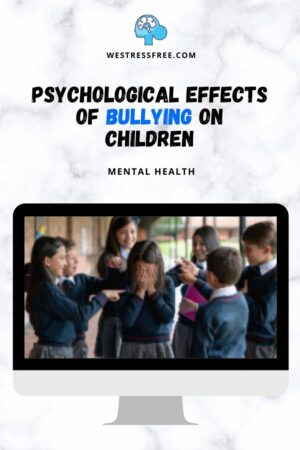
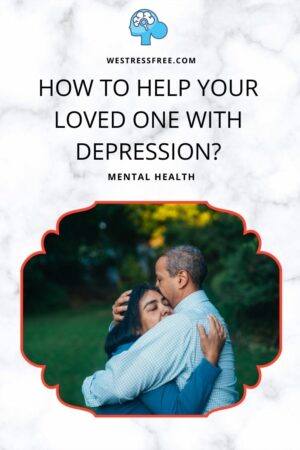
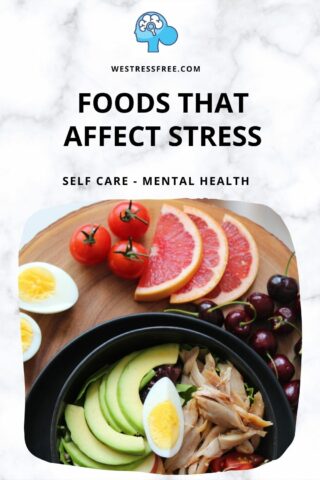
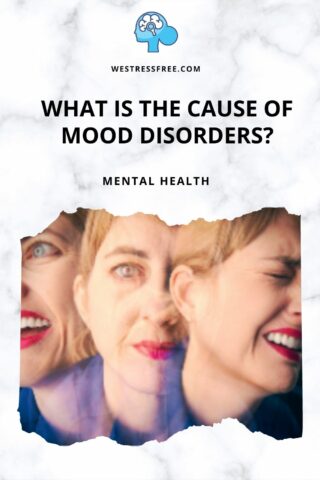
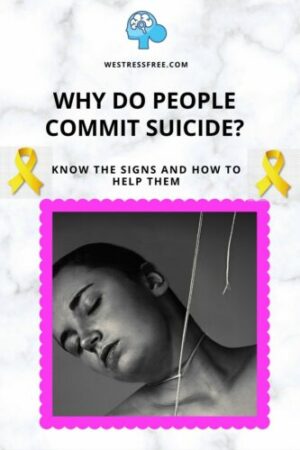
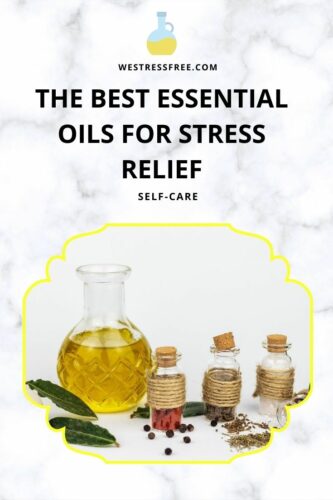

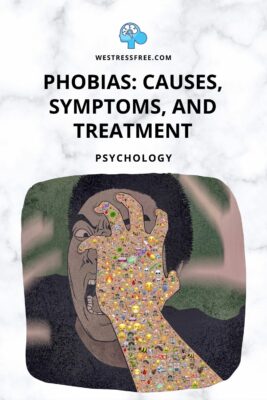

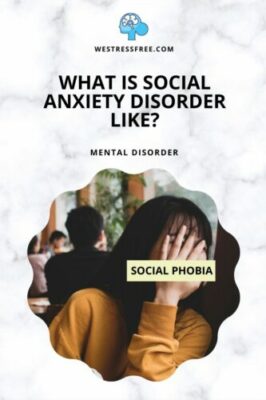
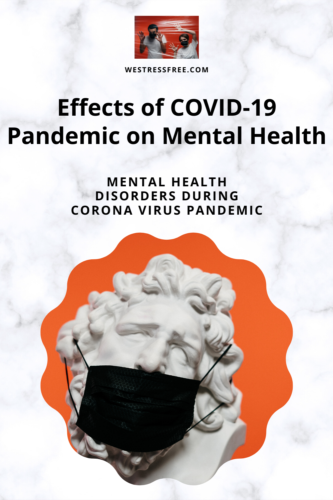













Thank you so much for this highly informative article, Ferra! This pandemic has certainly caused people to feel hopeless at times, which breeds the various mental disorders that you mentioned. While God didn’t cause this pandemic, I fully believe that he is allowing this to happen to bring this world back to him-God wants us to repent of our sins, believe in and turn to Jesus Christ, ask Jesus into our lives as our Lord and Savior, and follow him the rest of our days. When we humble ourselves, God will heal our land. God bless you!
Hi C.N.,
Yes, I couldn’t agree with you more. During this unfortunate time, we can still learn how to be strong and remember to get close to Him.
Thank you for visiting my site and reading this post.
Glad to know that you found this post useful. 🙂
I really appreciate your kind words, sharing, and support.
Stay blessed, safe, happy, and healthy!
Ferra
I am so glad you wrote about this topic. I think it is very important and often doesn’t get talked about enough. I have been worried about increased mental health issues for a while now, my own as well as in general. I think you are giving some very useful tips here. I especially think that filtering the news is so important as we simply get flooded everyday with mostly negative news. I had to take breaks from social media several times during this time and be very careful to not overload my brain. I think for me spending time in nature is the number one healing activity I can do that truly helps me to clear my brain and feel more calm.
Hi Manuela,
I think you did the right thing by taking care of your own well-being through social media detox and go find healing in nature.
Thank you for visiting my site and reading this post.
Glad to know that you found this post useful. 🙂
I really appreciate your kind words, sharing, and support.
Stay safe, happy, and healthy!
Ferra
Maintaining the right mental health in this period of pandemic us as challenging as doing anything else and I can totally resonate with it considering the total effects of the covid 19 on the world. A lot of things has happened and I can only pray that peace be coming back. I love what you have shared here and I will definitely ensure to share most of the things that I have seen here. Thanks
Hi Carol,
Thank you for visiting my site and reading this post.
Glad to know that you found this post useful. 🙂
I really appreciate your kind words, sharing, and support.
Stay safe, happy, and healthy!
Ferra
The pandemic have somehow had it’s an advantage to everyone and also its disadvantages indeed. Some people have had the chance to link with their family and make a great bond with their kids and it’s looking great. However these mental effects can’t be overlooked and like myself whose job is a day job, staying in all the time have made really lazy to work and some other things which I hope to overcome soon
Hi Bella,
I couldn’t agree with you more. There are always two sides to everything. The good and the bad. Mental health is so important, even more so nowadays with the uncertainty and everything that is affected by C19.
Working from home is not for everyone, but it is doable. Setting up goals will also help you in order to keep your momentum going and stay productive.
Thank you for stopping by my website, reading the post, and leaving a kind comment.
I appreciate you for sharing your thoughts and support.
Stay safe, happy, and healthy!
Ferra
Thank you so much for writing this post and spreading awareness about how to overcome the pressures people are facing during this pandemic crisis. I feel like you hear so much about the ‘fear’ portion and not enough tips on how to overcome or deal with these fears. I think the information is wonderful that you provided and such a value add for many looking for coping strategies during this time.
Hi Lindsey,
Thank you for stopping by my website, reading the post, and leaving a kind comment.
I appreciate you for sharing your thoughts and support.
Glad to hear that you found this post useful.
Stay safe, happy, and healthy!
Ferra
Yes yes, I totally agree with what you have written on your website here because I have seen a lot of people who have actually lost it. It first started with videos of residents in China who were put on lockdown. The truth is we cannot stand to live in bondage and stay indoors. I think your post has really touched an important aspect in our lives. Great job here.
Hi Payton,
Staying indoors all the time sure can affect our mental health. So, it is important to go out and enjoy the morning sun for at least 10-15 minutes every day. To be safe, we can just sit in front of our house/apartment, enjoy the breeze and morning sun. It is better than nothing. 🙂
Thank you for stopping by my website, reading the post, and leaving a kind comment.
I appreciate you for sharing your thoughts and support.
Glad to hear that you found this post useful.
Stay safe, happy, and healthy!
Ferra
Great article on Effects of COVID-19 Pandemic on Mental Health. I have thought about this a lot and my concern for those struggling is great. I hope that everyone has an opportunity to get help from a professional. I will be sure to share this article!! Do you have any statistics on those that need help during this time?
Hi Alyse,
I think the statistics could be found locally and regionally. I would suggest to check the WHO or CDC sites.
Thank you for stopping by my website, reading the post, and leaving a kind comment.
I appreciate you for sharing your thoughts and support.
Glad to hear that you found this post useful.
Stay safe, happy, and healthy!
Ferra